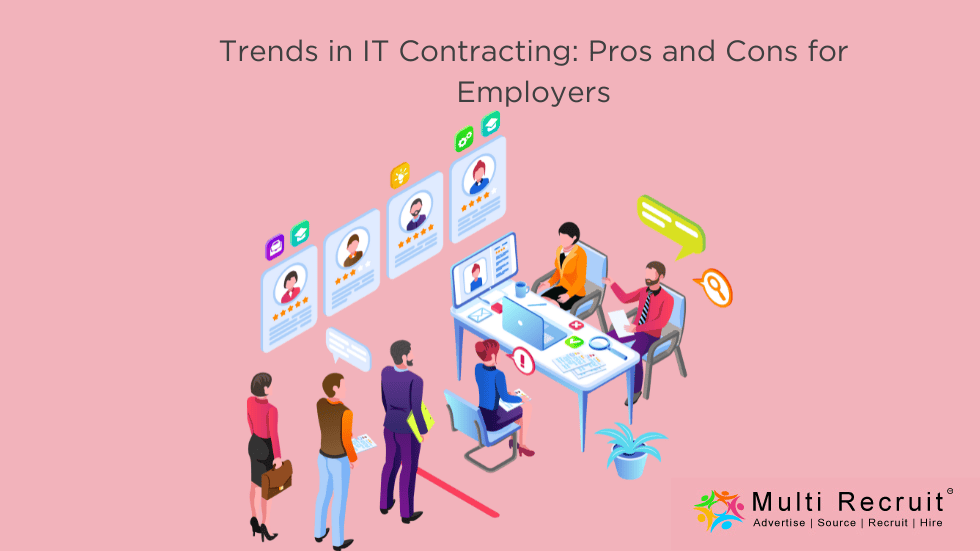In the ever-evolving landscape of Information Technology (IT), the way businesses source and manage talent has undergone a significant transformation. One notable trend that has gained traction in recent years is IT contracting. As companies seek flexibility and specialized skills, IT contracting has become a popular choice. In this blog post, we’ll delve into the pros and cons of IT contracting for employers, shedding light on key considerations in collaboration with Multi Recruit, a leading talent acquisition partner.
What are the Pros of IT Contracting for Employers?
Flexibility and Scalability: One of the primary advantages of IT contracting is the flexibility it offers. Employers can scale their workforce up or down based on project requirements. This adaptability is crucial in a dynamic business environment where project timelines and scopes can change rapidly.
Access to Specialized Skills: IT contractors often bring a wealth of specialized skills and expertise to the table. This is particularly beneficial for companies looking to undertake projects that require niche technical knowledge. Contracting allows employers to tap into a pool of talent that might be difficult to find in a traditional full-time hire.
Cost Savings: Contracting can lead to cost savings for employers. While the hourly or project-based rates may seem higher on the surface, considering factors like benefits, taxes, and other overhead costs associated with full-time employees, contracting can often be a more cost-effective solution for specific projects.
Reduced Administrative Burden: Managing payroll, benefits, and other administrative tasks for full-time employees can be time-consuming. With IT contracting, employers can streamline these processes, as contractors are responsible for their own taxes, insurance, and benefits.
What are the Cons of IT Contracting for Employers?
Limited Company Loyalty: IT contractors are, by nature, transient. They might not have the same level of loyalty to the company as full-time employees. This lack of long-term commitment could impact team cohesion and company culture.
Potential for Knowledge Gaps: While contractors bring specialized skills, there is a risk of knowledge gaps as they may not be as familiar with the company’s internal processes, systems, or culture. This can result in a learning curve and potentially slower project initiation.
Dependency on Individual Contractors:
Relying heavily on individual contractors can pose a risk if they suddenly become unavailable or decide to move on to other opportunities. This dependency can be mitigated by diversifying the talent pool and ensuring knowledge transfer processes are in place.
Higher Per-Hour Costs:
While contracting can offer overall cost savings, the per-hour cost of contractors can be higher than the equivalent cost for a full-time employee. It’s crucial for employers to weigh this against the benefits and value brought by the contractor’s specialized skills.
Conclusion:
In conclusion, IT contracting presents a viable and strategic option for employers seeking flexibility, specialized skills, and cost-effectiveness. However, it’s not without its challenges. Finding the right balance between contracted and full-time staff, managing potential knowledge gaps, and ensuring a smooth transition between contractors are key factors in successfully leveraging the benefits of IT contracting.
As businesses continue to navigate the ever-changing IT landscape, partnering with a trusted talent acquisition firm like Multi Recruit as a contract staffing agency in India can provide invaluable support in identifying and onboarding top IT contractors, ensuring that projects are delivered successfully and efficiently.
Frequently Asked Questions
- What are the primary advantages of opting for IT contracting over traditional hiring for employers?
The main advantages of IT contracting for employers include enhanced flexibility in scaling the workforce, access to specialized skills for specific projects, potential cost savings, and a reduction in administrative burdens associated with managing full-time employees.
- How can employers mitigate the risk of knowledge gaps when relying on IT contractors for specialized projects?
To mitigate knowledge gaps, employers should prioritize effective communication, documentation, and knowledge transfer processes. This ensures that IT contractors gain a comprehensive understanding of the company’s internal processes, systems, and culture, minimizing the risk of project delays or misunderstandings.
- Are there potential drawbacks associated with the lack of company loyalty in IT contractors, and how can employers address this concern?
Yes, the transient nature of IT contractors may lead to a perceived lack of company loyalty. Employers can address this by fostering a positive working environment, offering professional development opportunities, and ensuring clear communication regarding project goals and expectations to create a sense of commitment.
- In what ways can IT contracting contribute to a company’s cost-effectiveness, and what factors should employers consider when evaluating the overall cost?
IT contracting can contribute to cost-effectiveness by eliminating overhead costs associated with full-time employees, such as benefits, taxes, and insurance. Employers should consider factors like hourly rates, project scope, and the long-term benefits brought by specialized skills when evaluating the overall cost-effectiveness of IT contracting.
- How can employers balance the benefits of IT contracting with the potential risk of dependency on individual contractors?
To balance benefits with the risk of dependency, employers should diversify their talent pool by working with multiple contractors. This approach minimizes the impact if one contractor becomes unavailable. Additionally, implementing knowledge transfer processes and documentation ensures a smooth transition between contractors, reducing dependency risks.

